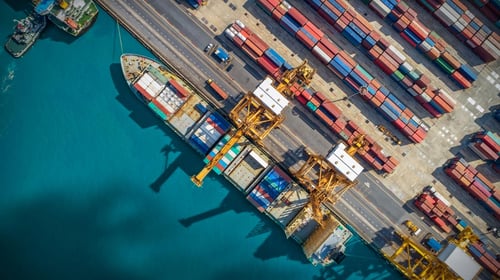Incoterms are globally recognised codes that help shippers understand when ownership is transferred from the buyer to the seller. These are important because they help answer the question of who is liable for any risk or costs during the journey.
CIF (Cost, Insurance, and Freight) and FOB (Free on Board) are two popular incoterms that you may want to use for your shipments. By making the correct choice between these incoterms, you can substantially affect the success of your supply chain. In this article, we'll cover what CIF and FOB mean, the advantages of each, and how you can decide which is best for your business.
What Does the CIF Incoterm Mean?
CIF, or "Cost, Insurance, and Freight", means that the seller holds primary ownership up until the point the cargo is delivered. The seller is responsible for necessary documents in both countries, as well as insurance costs. The shipment's ownership and liability only transfer when the goods pass the boat's railing at the destination port.
What are the Advantages of CIF?
CIF is an incredibly convenient option for the buyer. Without responsibility for any risks, claims, or freight concerns in transit, the buyer is given room to relax. Because of this, CIF is generally considered a favourable choice for new shippers who aren't used to the intricacies of overseas supply chains. Some buyers who generate high margins may also use CIF shipments because they consider the peace of mind worth the cost.
What are the Disadvantages of CIF?
Although the buyer isn't responsible for shipping or insurance costs, CIF is often more expensive than other Incoterms. The seller will usually invoice the buyer for these costs and include an additional fee to generate a more significant profit. So while you may have less to worry about, you're paying a premium for this convenience.
.jpg?width=500&name=shutterstock_1570847962%201%20(1).jpg)
Additionally, CIF shipping means that the buyer is relinquishing control over their shipment. Because of this, it may be more difficult for the buyer to find accurate shipping information.
Finally, because of the lack of control, the buyer has the risk of being put in difficult situations. For example, the buyer has to rely on the seller to provide the correct importer documents. If this file is late or incorrect, there can be substantial penalties and fines. Similarly, the insurance payout is sent to the seller if something happens to the goods during transit. Because the buyer has already paid the seller, this can create complicated and uneasy situations as the seller is now responsible for reimbursing the buyer.
What Does the FOB Incoterm Mean?
FOB, or "Free on Board", means that the responsibility for paying, contracting, and managing shipments, falls entirely on the buyer. There are a couple of subcategories to FOB shipments you'll want to define before using them.
Origin or Destination
FOB Origin means that the buyer gains ownership of the goods the moment the goods are loaded onto the container at the point of origin. In comparison, FOB Destination means that the buyer only assumes ownership at the destination, and the seller owns the goods while in transit.
Collect and Prepaid
Freight Collect means that the buyer is responsible for paying any freight charges to the carrier company. In contrast, FOB Prepaid means that the seller is responsible for paying these charges.
Most FOB shipments use FOB Origin, Freight Collect. Under this Incoterm, the seller loads the goods and clears them for export. Then the buyer becomes responsible for them as soon as the freight haulier picks up and signs off on the package.
What are the Advantages of FOB?
The first significant advantage of FOB shipments is that they are usually the most cost-effective option for buyers. Compared to CIF shipments, the buyer doesn't need to pay any high fees to the seller. 
Additionally, because the buyer has much more control and can choose their freight forwarder, they have much more control over the timing and cost of their shipment. Finally, the more accessible information means that the buyer can efficiently resolve any concerns if issues arise.
What are the Disadvantages of FOB?
FOB shipments put a lot more responsibility on the plate of the buyer. Because they are liable for the goods while in shipment, new importers might find it safer to use other Incoterms instead of risking potential severe penalties.
Is CIF or FOB Incoterms the Correct Choice for my Business?
The primary difference between CIF and FOB incoterms is when ownership of the goods transfers from the seller to the buyer. Under CIF incoterms, responsibility is only transferred once the cargo reaches the destination port. In comparison, under FOB incoterms, the buyer's ownership is usually given to the buyer once the shipment leaves the port of origin.
Choosing which option is better is usually a question of what you think is more important. If you're willing to pay for convenience or aren't confident in your understanding of shipping overseas, CIF might be the correct option for you. In comparison, if you're looking to optimise your supply chain and want more control, FOB is likely the better choice.
If you're still unsure which option is right for your business, you can get help by consulting an international shipping expert. WTA UK can help you find a solution to your delivery needs. Contact us to find out more.








